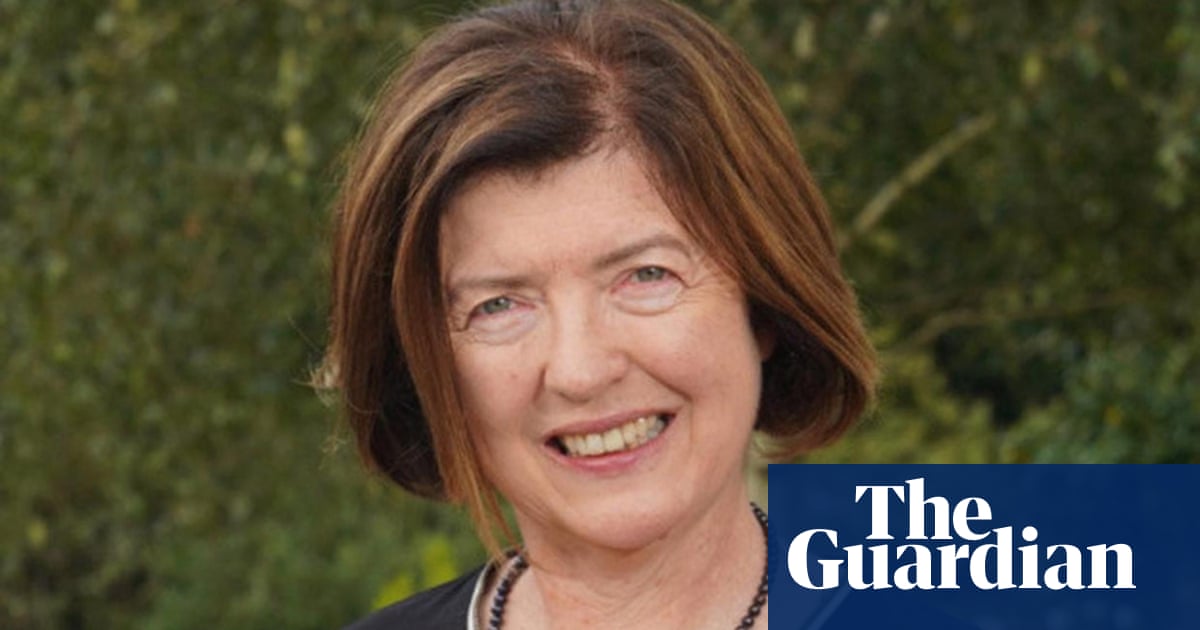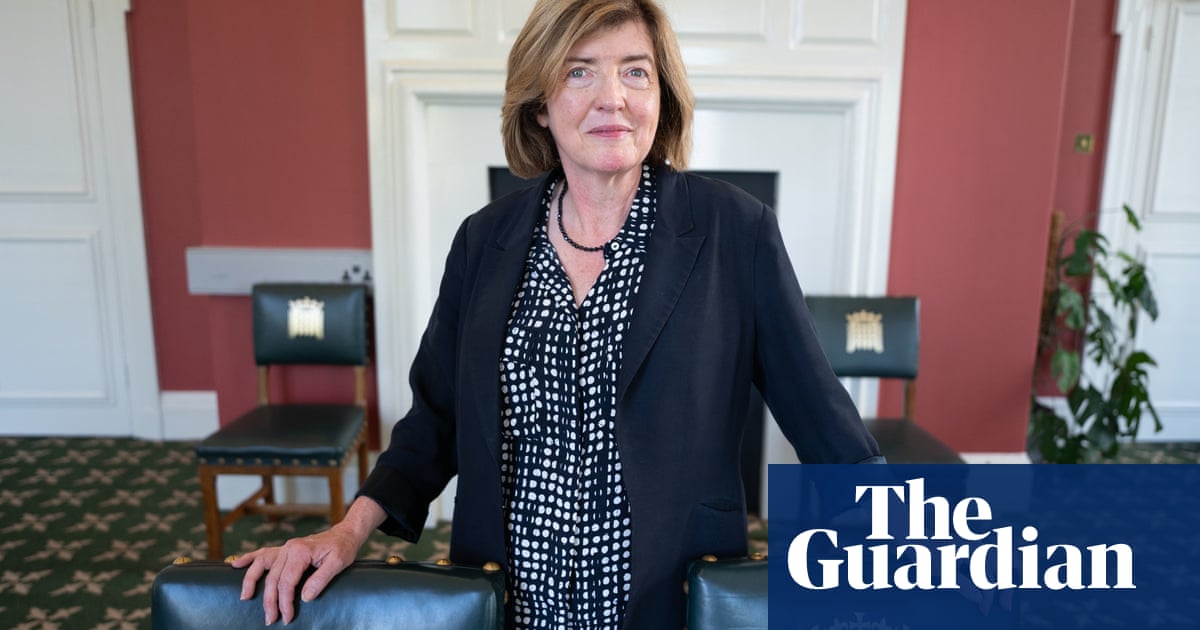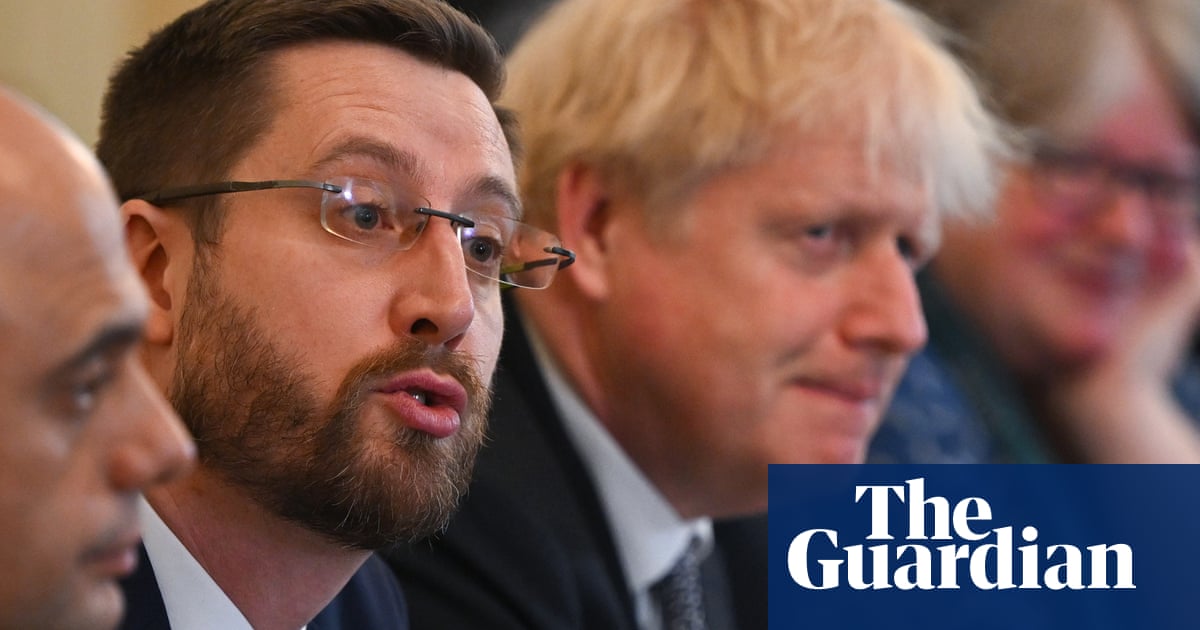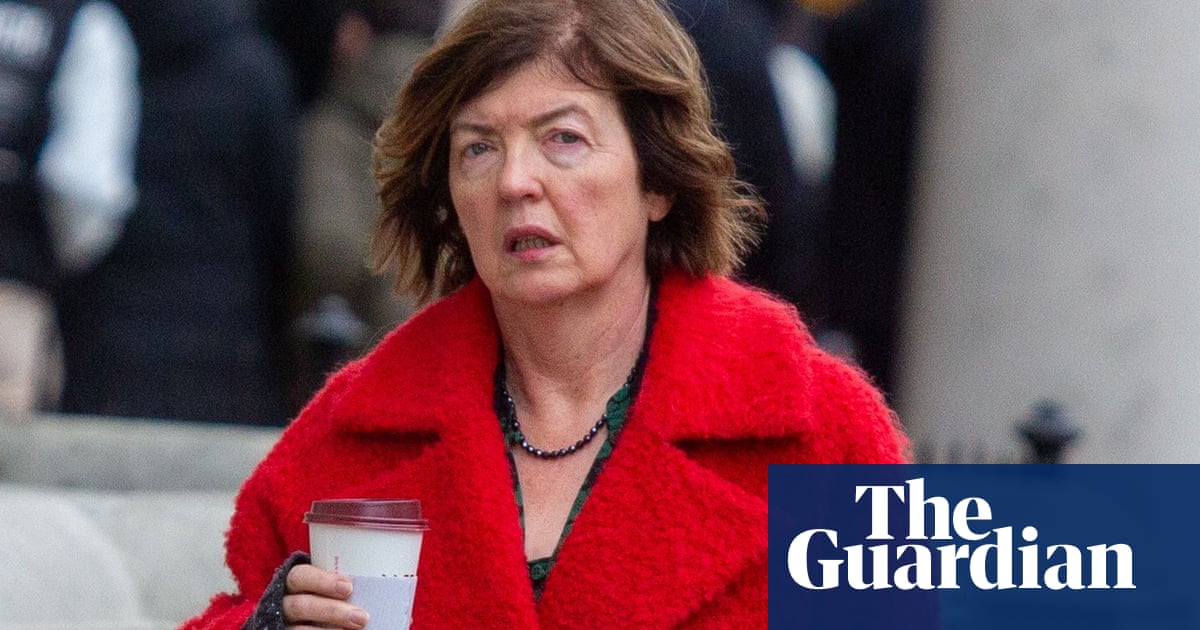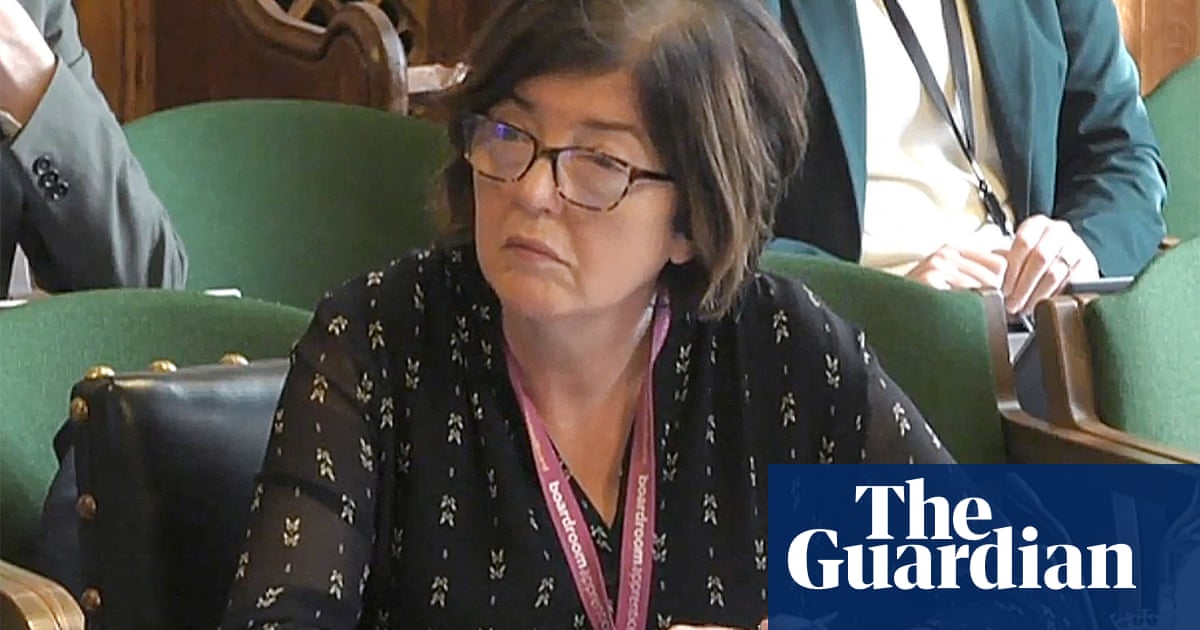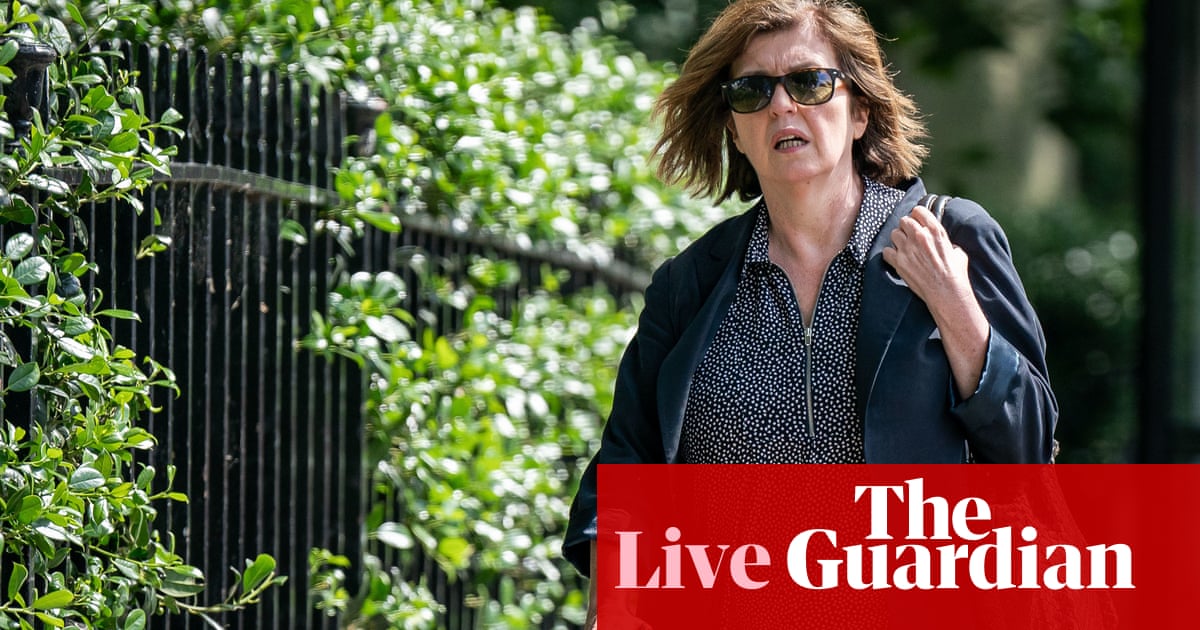
Afternoon summary
Keir Starmer has accused Rishi Sunak of “killing the dream of home ownership for a generation” with his decision to scrap housebuilding targets, as he again used prime minister’s questions to try to portray Sunak as privileged and out of touch.
Labour has confirmed that Sue Gray will take up her job as Starmer’s chief of staff even if the Advisory Committee on Business Appointments recommends a long wait before she starts.
The Scottish National party has appointed a new auditor more than six months after the previous firm quit, as the senior leadership moved to reassure members that the looming accounts deadlines in Scotland and at Westminster will be met.
Bim Afolami, a senior Tory MP, has been criticised for failing to declare he was paid £2,000 a month to chair a pressure group lobbying Rishi Sunak.
Plaid Cymru inquiry finds culture of bullying and misogyny in party
Plaid Cymru have apologised after a damning review found a culture of harassment, bullying and misogyny in the party, PA Media reports. PA says:
The report states the Welsh nationalist party had “failed to implement a zero-tolerance approach to sexual harassment” and that women had been “especially” let down.
It also said “too many instances of bad behaviour” by elected members have been tolerated within the party so that staff felt “there is little point in raising concerns”.
A total of 82 recommendations have been made to “detoxify” the party’s culture.
Plaid leader Adam Price said he was “deeply sorry” and that all the recommendations would be taken on board.
The party’s national executive committee and Price jointly commissioned the review, which was led by former Plaid politician Nerys Evans, and it began to look into the party’s culture last December …
Evidence from an anonymous staff survey and elected members “highlight cases of sexual harassment, bullying and discrimination”, the report said, claiming: “These are not isolated cases.”
The survey also found most discrimination was gender-based, it said.
Sunak accused of making multiple misleading comments at PMQs
As mentioned earlier, Rishi Sunak faced an unusually high number of complaints after PMQs today about the accuracy of what he told MPs. Three MPs used points of order to query what he said, but Full Fact, the fact-checking organisation, has been on the case too.
Here are misleading, or potentially misleading, comments that have been flagged up.
Sadiq Khan’s record on building homes in London
Sunak said:
In London, the former conservative mayor [Boris Johnson] built 60,000 affordable homes in his first five years in office. How many has the current Labour mayor managed? Half of that.
The Labour MP Dawn Butler questioned this after PMQs. She said:
Unfortunately, the prime minister has inadvertently misled the house this week when he claimed that the former Tory prime minister built more houses than the current Labour mayor. Official statistics are not open to interpretation. Last year, the number of new homes in London was up 22% compared with the Tory mayor’s final year. More than 23,000 new City Hall-funded council homes have been started since 2018, with more than 10,000 in the last year alone.
The discrepancy was partly explained by the fact that Sunak was using these figures, from two years ago, while Butler was referring to more recent figures.
But Labour and the Tories have been trading rival claims on this subject for years, often using different definitions. The housing expert Peter Apps published a good article during Khan’s first time of office trying to adjudicate. He sides with Khan. He also points out that most of the affordable homes completed during Johnson’s years as mayor were set up under a Labour government programme over which he had no influence.
Scotland’s record with disadvantaged pupils going to university
Sunak said:
I gently point out to [the SNP leader at Westminster, Stephen Flynn] somebody from a disadvantaged background is far more likely to go to university in England than they are in Scotland.
After PMQs the SNP MP Marion Fellows said this was misleading. She said:
The figures [Sunak] used are simply the Ucas applications directly from school, but in Scotland, as I well know as a former further education lecturer, most disadvantaged children and adults go through the college route, whereby they can do a higher national certificate or higher national diploma, moving to first, second or third year of a university course, or join an access to higher education course at any time.
Crime figures
Sunak said:
Crime is 50% lower than it was when we took office.
After PMQs Yvette Cooper, the shadow home secretary, said:
The prime minister used a figure for crime that did not include fraud, even though that is the fastest-increasing crime and has been one of the most prevalent and damaging crimes. He has been repeatedly challenged on this but again used the figure without fraud.
The Full Fact factchecking organisation has published an analysis making the same point.
Responding to Cooper, Tom Tugendhat, the security minister, said fraud was not included in the figures for 2010 because it was not being counted then.
Dentists working for NHS
Sunak said:
There are more than 500 more dentists working in the NHS this year than last year.
Full Fact says this is does not present the full picture.
Police numbers
Sunak said:
There is now a record number of police officers across the country thanks to the actions of this government.
Full Fact says this is potentially misleading, because it is not a per head figure.
Humza Yousaf says he hopes fringe venue"s decision to cancel appearance by gender-critical SNP MP can be reversed
Humza Yousaf, Scotland’s first minister, has said that he hopes a decision to cancel an appearance by the SNP MP Joanna Cherry at the Edinburgh festival fringe because of her gender-critical views will be reviewed.
Cherry, who is opposed to self-identification for transgender people, was due to speak at an In Conversation With event at a fringe venue in August. But, as Libby Brooks reports, the Stand comedy club said it was cancelling the booking because key venue staff were not willing to work with Cherry.
Commenting on the row today, Yousaf, the SNP leader, said:
I really do hope that Joanna’s show can go ahead.
I hope there’s a way there can be a compromise found in terms of Joanna’s show going ahead.
Joanna and I have a difference on a number of issues, including for example the GRR [gender recognition bill] bill that was passed by the Scottish parliament.
I do think it’s important that those views are heard.
But Yousaf also said that it was not his job as first minister to “tell comedy clubs and other venues what shows they must and must not put on”.
According to a report by Jim Fitzpatrick for openDemocracy, John Pullinger, who chairs the Electoral Commission, wrote to Tom Tugendhat, the security minister, six months ago saying he should use the national security bill to tighten the rules in place to stop foreign governments funding British political parties.
In his letter Pullinger said:
We have recommended that existing controls on donations should be strengthened so that parties and campaigners can only accept donations from companies that have made enough money in the UK to fund the amount of their donation.
Currently, a company can donate to a UK political party or campaigner if it is registered at Companies House and ‘carrying on business’ in the UK. There is no requirement for the company to show that it has made enough money in the UK to give or lend to campaigners.
Six months on, the Electoral Commission has still not received a reply, Fitzpatrick reports.
Earlier this afternoon the government used its majority in the Commons to vote down a Lords amendment that would have addressed Pullinger’s concerns. (See 4pm.)
MPs vote down Lords amendment intended to tighten laws stopping foreign powers funding UK political parties
In the Commons MPs have been voting on Lords amendments to the national security bill. The government used its majority to vote down an amendment passed in the Lords that would require UK political parties to publish a policy statement to identify donations from foreign powers.
Sir Julian Lewis, the Conservative chair of parliament’s intelligence and security committee, said he welcomed the Lords amendment, which would “increase the transparency and accountability of our political system”.
He said that in the past the UK had “clearly welcomed Russian money, including in the political sphere”, and he went on:
The amendment is eminently reasonable. It shouldn’t be controversial for political parties to want to ensure the transparency of their foreign political donations.
We must protect against covert, foreign-state-backed financial donations if we are to defend our democratic institutions from harmful interference and influence.
But Tom Tugendhat, the security minister, said the government was going to vote down the amendment because it was not needed. He explained:
The law already makes robust provision in relation to donations to political parties. Foreign donations are banned, it is an offence to accept them and there are strong rules safeguarding against impermissible donations via the back door.
The Lords amendment was voted down by 254 votes to 134 – a majority of 120. Lewis was the only Conservative MP voting against the government to keep the amendment in.
Spotlight on Corruption, which campaigns against corruption, claimed the vote left “the forthcoming UK general election desperately vulnerable to interference by hostile states, kleptocrats and oligarchs”.
It pointed out that Lord Evans, the former head of MI5, was among the peers backing the amendment in the Lords.
Artificial intelligence could have as big an impact on jobs as Industrial Revolution, Patrick Vallance tells MPs
Artificial intelligence (AI) could have as big an impact on jobs as the Industrial Revolution, Sir Patrick Vallance has told MPs.
In a session with the Commons science committee to mark the end of his term as the government’s chief scientific adviser, he said that AI would bring “a lot of benefits” and that it was a mistake to view it as “all risk”.
But he did highlight three concerns with the technology. He told the MPs:
The first is, with the large models and the potential, how do you determine what’s true and what’s not? As you can get replication of all sorts of things.
And the second is there will be a big impact on jobs. And that impact could be as big as the Industrial Revolution was. How are we going to think about that, over a slightly longer timeframe?
And the third, of course, is what happens with these things when they start to do things you really didn’t expect and what are the risks associated with that? That may be a slightly longer-term question.
Commenting more on the employment implications of AI, Vallance said it would “make life easier in all sorts of aspects of everyday work, in the legal profession, in all sorts of other areas as well”.
He went on:
On the jobs aspect, I think in the Industrial Revolution, the initial effect was actually a decrease in economic output as people sort of realigned in terms of what jobs were, and then a benefit.
And I think we need to get ahead of that actually. Which are the jobs, the sectors that will be most affected? And what are the plans to retrain and give people their time back to do a job differently, because there will be jobs that can be done by AI, which can either mean lots of people don’t have a job, or it can mean actually lots of people have a job that only humans can do.
And in the area I know most about in this – in medicine – that could be that you actually get more time with your doctor rather than being pressurised. So that could be a good outcome.
How Sunak and Starmer traded jibes about their parties" respective economic records
This is from Greg Hands, the Conservative party chair, responding to what Keir Starmer said at PMQs after Rishi Sunak mentioned the notorious “no money left” note left in the Treasury at the end of the last Labour government.
Sunak said:
Our memories aren’t that short. We all know what happened last time when they were in power, there was no money left for the country.
And Starmer replied:
Debt doubled since 2010, growth down, tax up, the economy crashed. They’re going to need a bigger note.
The Conservative MP Philip Davies lobbied the government on behalf of a casino to introduce a measure that was then included in last week’s gambling white paper, Rob Davies reports.
Labour says Sue Gray will become Starmer"s chief of staff even if appointment subject to long delay
At the Labour party’s post-PMQs briefing Keir Starmer’s spokesperson indicated that Sue Gray would take up her job as Starmer’s chief of staff even if the Advisory Committee on Business Appointments recommended a long wait before she starts.
Acoba can say that ministers or officials should have to wait up to two years before taking up a job outside government (although a shorter period, such as three months or six months, is more common). Labour has said it will abide by the Acoba ruling, which is only advisory.
The spokesperson said:
The Labour party is fully supporting the Acoba process and the Acoba process is that Sue Gray submits her form with the information as requested of her by Acoba in the usual way.
Asked whether Gray will be hired no matter how long her appointment is delayed, the spokesman said:
Sue Gray is going to be Keir Starmer’s chief of staff.
There is no interim chief of staff, and any plans to hire someone for that role temporarily would depend on what delay Acoba recommended, he said.
The spokesperson also accused the Tories of trying to “politicise” the process by introducing an “additional political process [the Cabinet Office inquiry into the appointment] which is not part of the standard process”.
The Economist’s Matthew Holehouse, who has been looking at precedents set by Acoba, thinks it is more likely anyway to impose restrictions on what Gray can do when she starts working for Starmer rather than a time-limited ban.
Q: Why did you say Dominic Raab should be proud of what he achieved when he stepped down? He had been found to be a bully.
Sunak said that Raab stepped in when Boris Johnson was ill, and did a good job. And he introduced reforms to the justice system, Sunak said.
That was it.
Jeremy Vine put it to Rishi Sunak that people feel the country is “falling apart”.
Sunak said the cost of living was a problem for people. He has set out his five priorities, he said.
Q: After 13 years, do you think the Tories need a period out of power?
Sunak said he had been PM for six months. He said he wanted people to judge him by his values and what he was doing.
Q: Are you confident you would get an ambulance quickly if you called one, and did not mention Downing Street?
Sunak said ambulance response times have more than halved since December. A range of measures were in place. They were working, he said.
Q: People are going to A&E because they can’t get a GP appointment.
Sunak said he comes from an NHS family. His dad was a doctor, his mum a pharmacist. He wanted to reform the NHS to improve access. He mentioned initiatives such as community diagnostic scanning, and more use of the private sector for operations.




